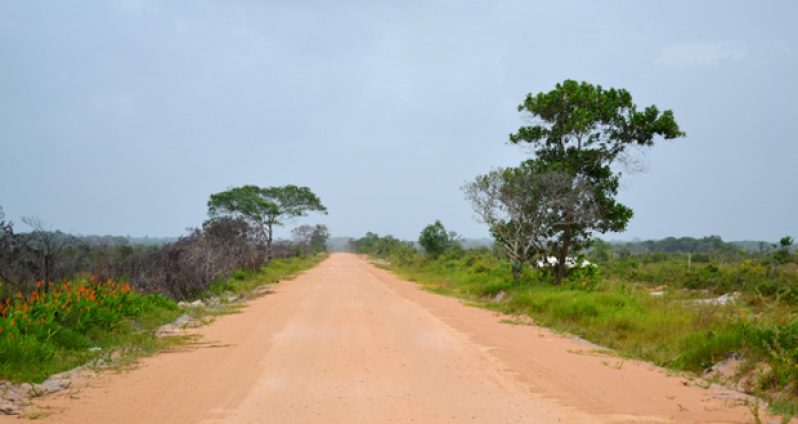By Alva Solomon
AS DRY weather conditions impact the country’s agricultural landscape, farmers at Laluni, off the Linden/Soesdyke Highway, are persevering through the dry spells; and with rains pouring in the community over the past few days, they are hoping for the best.

Most households in the community are heavily dependent on agriculture, engaging in subsistence and commercial farming. The farmers told the Guyana Chronicle that the dry weather conditions have hit their activities on the farmlands. However, while it is waterless in some parts, the planters are managing to produce for the city market, particularly on Fridays and Saturdays, when some are lucky to sell their entire load of crops at the Stabroek Market.
This newspaper visited the area twice last week, and while the conditions last weekend were hot and sunny, the rains poured for two hours mid-week, bringing joy and hope to Edward Henry.
The son of Vincent Henry, founder of Laluni, Edward told this newspaper that he plants a variety of crops, including peppers, black-eye peas and sorrel. He said he has been living at Laluni for decades, and farms in the lands nearby as his main source of income. He plants on a medium scale.

Henry was one of several persons who had objected to plans by the Guyana Lands and Surveys Commission (GL&SC) to convert the farmlands of several farmers into reserves last year. He said the dry weather is currently affecting the area badly, but he is mitigating those conditions by planting “whatever I can manage and when the water is available.”
He sells his goods at the Stabroek Market on Friday evenings and Saturday mornings. Sometimes his goods are sold out to retail buyers who retail the goods at various prices.
For Dennis Dundas, there can be losses on the market. He has been farming at Laluni for the past 10 years, but has been into farming for some 40 years, having started at St Cuthbert’s Mission

further up the highway as a young man.
Like most farmers in the community, he sells his produce at the Stabroek Market on weekends, making the much-anticipated trip to the city market on Fridays. He said he generally copes with the vicissitudes of farming, but in his words, recently “things have been tough.”
SORREL AND PAPAWS
Dundas was packing his buckets with cleaned sorrel and papaws when this newspaper visited. He said the weather is one issue but the market is another. With a slight look of concern, he described the situation as frustrating “in the sense you have a product but people na buy now,” he said frankly. He said this happens from time to time, and given the seasonal nature of the various crops he plants, he has been managing to handle the markets available to him.

NO FIXED PRICE
Dundas explained that when he ferries his goods to Georgetown, the buyers determine the prices. “You see now, we ain’t got no fixed price for these products, you know. When you go on the market, is what you get is that you have to take,” he explained, adding that this is the disadvantage that farmers face.
He said that this has been the trend for years, and he noted that when the crop is in bulk, the prices drop drastically, and to cushion this eventuality, he would grow another crop to be reaped at the same time as the bulk crop.
The sorrel he is selling at the moment comes from a crop he planted in the last quarter of 2015.
“All like for the sorrel, for example, right now the sorrel got a lil price, about $1,000 a bucket (2-gallon bucket), but let me tell you the reason for that (rise in cost) — is because the crop done reap out before the Christmas time,” he said. He had planted a smaller crop of sorrel to ripen at this time of year, he noted, saying that it had entailed a lot of hard work. “I do the watering and the hard work; in the end it can still work out,” he said optimistically.
Dundas said dry weather conditions have also affected his farming, but with a few downpours last week, his optimism is again soaring.
The weather conditions have affected the planting cycle of some farmers, Dundas said. “Some people are suffering, you know. People don’t have produce with how the weather dry,” he said.
At the moment, he has a variety of crops which he plans to reap in the weeks ahead. These include watermelons, oranges and other citrus fruits, all of which will hit the Stabroek Market in a few Fridays. He said he plants all of his crops on some four acres of land, noting that farming is the backbone of the community.
In some parts of the community, several farms were neatly prepared, and the vegetables lined the beds as the rains gave succour to the plants just when this newspaper visited the area.
Further south, closer to the centre of the community, several kitchen gardens were blooming.
Leonard Torres, an 86-year-old farmer and Laluni’s oldest resident, was cleaning his patch of squash as the rains eased last week. He lives in the more populated part of Laluni at Number Two, the section of the community where most persons commune. Torres has been living in the community since 1972, and farming is his main area of expertise. He said that access to the city markets is one of the better reasons for his liking Laluni as a farming area.
Cash crop farming in the area became popular when the Demerera Tobacco Company (Demtoco) ceased cultivating tobacco there in the early 1990s. Farmers have since planted a variety of crops, including vegetables and fruits.
While access to markets is not an issue, better prices for goods have always been a concern for farmers in the area; but planting and reaping will not cease anytime soon at the self-sufficient community of Laluni.


.jpg)











